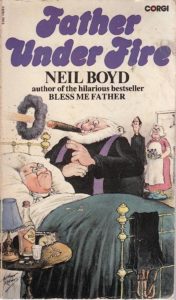The fourth in Neil Boyd‘s Bless Me, Father series finds the irascible Father Duddleswell laid up with lumbago just as the priest with whom Duddleswell began his career settles in for an extended visit. Father Abe — most definitely not Father Abraham, with seven sons — is getting on in years, but still sly and not above using his age to get what he wants. Boyd does not directly ask how many times Father Abe has rolled out the “this could be my last chance to …” argument, but he shows that it is often enough that he’s having several last chances at things.
The pillars of St Jude’s populate pages of Father Under Fire just as faithfully as the other books of the series: Father Neil, the young Catholic priest nearing the end of his first full year out of seminary; Father Charles Duddleswell, longstanding priest of the parish, a stickler for rules unless they get in the way of the greater good; Mrs Pring, the housekeeper who appears to get on Duddleswell’s last nerve but is his steadiest supporter; Billy Buzzle, bookmaking neighbor with a keen eye for profitable joint ventures; Dr Donal Daley, boon companion and prodigious drinker of whiskey.
In the book’s twelve chapters, other characters come and go with varying regularity, as required by the tales that Boyd tells. Father Abe tells of “young Charlie,” Duddleswell’s first years as a clergyman. The Bishop, his canon, and a fierce Mother Superior provide the authoritative face of the Catholic church and occasional comic relief. Most of the parishioners appear in one or two stories, illustrative of Boyd’s anecdotes. His writing has gotten more deadpan over the course of the series, as he has come to trust his readers more in their ability to recognize when he is being funny, and the stories roll past with very little in the way of signposting. Partly for that reason, the deeper moments, the philosophical asides land with greater effect.
[Father Abe] said, “[Father Duddleswell] likes you, laddy,” and I said, “Thank you, Father,” and he said, “Life is so gorgeous, the mystery is we are not always deliriously happy.” (p. 45)
But mostly, it’s funny tales. A scheme involving apparently miraculous holy water is turning out to be a bust, when Father Neil says to Father Duddleswell, one last miracle.
Just then, the door bell rang.
“There,” I cried enthusiastically. “That could be a stranger wanting to make a huge donation to the parish.”
“Or Dr Daley promising to be eternally tee-total.”
“Or,” I yelled, “Billy Buzzle asking to become a Catholic.”
When Mrs Pring came in, Fr Duddleswell beamed at her. “Tell me the worst, Mrs Pring.”
“Mother Stephen,” she said.
Fr. Duddleswell, realizing the game was finally lost, lifted the carton [of holy water] off his desk and deposited it in my arms. “Yours for keeps, Father Neil.”
“You were expecting me, Father?” Mother Stephen asked.
“Not exactly, Mother. But sit yourself down all the same. As many welcomes to you as there are straws in the thatch.”
The Superior looked upwards suspiciously. “But you have tiles on your roof, Father.” (p. 103)
Or in matters more profane:
“In my experience,” [said Dr Donal], “there is not too much indulgence in sex today but too little”
Fr Duddleswell looked at him as if he had just dropped dead. “You cannot mean it, Donal.”
“I do. Sex is like prayer or playing the fiddle. You need practice to be any good at it. But what with wireless and cinema, there’s less time and energy for it nowadays than since the era of fig leaves. And if this new television thing catches on in a big way, I tell you, there’ll be almost none at all.” (p. 106)
Boyd must have been chuckling to himself as he wrote that decades later, from the other side of contraception pills and the sexual revolution. What he and Dr Donal might both think of the internet in that regard, I hesitate even to guess.
Much levity is also had with several of the characters’ Irish background.
“Do you remember, Charles, in that Summer of ’37 when we climbed the Holy Mount. An American asked me ‘How do you light a peat fire?’ and he pointed at the golden glow in the pub grate.”
“Do I remember?” Fr Duddleswell chuckled. “I told him, ‘How should I know how to light a peat fire? Nobody round here knows.’ And the Yank looks real puzzled and says, ‘What about that fire there, isn’t that peat?’ and I says, ‘Oh, ’tis, but y’see, that fire was lighted before the Spanish Armada.'”
“It’s true what our parish priest is telling you,” Dr Daley insisted. “There were fires alight when Columbus set sail from Galway that are still burning there today.”
“They have pulled houses down,” Fr Duddleswell said, “and rebuilt ’em round a still smouldering turf fire. By the God that’s over me, I’m not lying to you.” (p. 178)
Interfaith relations turn up in several chapters, as does doctrine on marriage and divorce.
Mr Probble [an Anglican clergyman] felt it was his duty to bring the conversation back to the topic of mixed marriages. “You said, Rabbi, that you agree with our Catholic hosts.”
“Not always. Not about, for an example, the divorce. Kings and patriarchs got divorces.”
That was so far from what he had been discussing the consensus was we should let it pass.
“After all things,” the Rabbi added, “you all think God Himself got divorced.”
This was news to everyone around the table. “All right, Rabbi,” Pinkerton [another Anglican] said mischievously, “let’s have it. Who do we say God married and divorced?”
“Us,” the Rabbi said.
That one word, softly spoken with a Slavonic sizzle at the end, flattened the rest of us. (p. 140)

